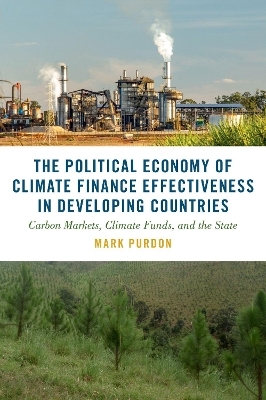
The Political Economy of Climate Finance Effectiveness in Developing Countries
Oxford University Press Inc (Verlag)
978-0-19-775683-6 (ISBN)
In The Political Economy of Climate Finance Effectiveness in Developing Countries, Mark Purdon shows that the effectiveness of climate finance instruments to reduce emissions under either strategy has depended on the interaction between prevailing ideas about how to develop a nation's economy, as well as state interests in various economic sectors. Based on multiple field visits over a decade in three countries, the author demonstrates that climate finance instruments have been more effectively implemented when the state treats them as vehicles for addressing priority development issues. Climate finance instruments were more consistently and effectively implemented in Uganda and Moldova than Tanzania, despite differences in state capacity between countries. This pattern held for the CDM, as well as subsequent instruments largely based on climate funds, such as Reducing Emissions from Deforestation and Forest Degradation (REDD+) and other national mitigation actions.
Contributing to broader debates on international climate cooperation, Purdon's findings inform international efforts to support national climate plans and catalyze low-carbon development by emphasizing the importance of domestic politics and the state.
Mark Purdon is Associate Professor in the Department of Strategy, Social and Environmental Responsibility at the Université du Québec à Montréal (UQAM) where he holds the Chair in Decarbonization. He is an expert in the emerging field of comparative environmental policy, which combines elements of comparative politics, comparative public policy and international relations. He is particularly interested in the relationship between climate change policy and political economy and has extensive research experience in both developing and developed countries. Purdon earned a PhD in political science at the University of Toronto in 2013 and completed a Postdoctoral Fellowship at the London School of Economics in 2014.
Chapter 1: Introduction
PART 1: Global Ideas About Climate and Development Cooperation
Chapter 2: The CDM and Liberal Environmentalism
Chapter 3: The Shift to Developmental Environmentalism
PART 2: Comparative Political Economy of Development
Chapter 4: Development Policy Paradigms in Historical Perspective
Chapter 5: Political Settlements in Tanzania, Uganda, and Moldova
Chapter 6: State Development Interests in Tanzania, Uganda, and Moldova
Chapter 7: Development Policy Paradigms in Tanzania, Uganda, and Moldova
PART 3: Evaluating Climate Finance Effectiveness
Chapter 8: Pockets of CDM Effectiveness
Chapter 9: Explaining REDD+ Effectiveness
Chapter 10: Explaining NAMA Effectiveness
Chapter 11: Conclusion
Appendix 1: Supplementary Information about Carbon Offset Projects
Appendix 2: Evaluation Criteria by DNA and by State Investment Agencies
References
Notes
Index
| Erscheinungsdatum | 13.07.2024 |
|---|---|
| Reihe/Serie | Studies in Comparative Energy and Environmental Politics |
| Zusatzinfo | 17 b/w figures; 30 tables |
| Verlagsort | New York |
| Sprache | englisch |
| Maße | 152 x 229 mm |
| Gewicht | 680 g |
| Themenwelt | Naturwissenschaften ► Biologie ► Ökologie / Naturschutz |
| Sozialwissenschaften ► Soziologie ► Spezielle Soziologien | |
| ISBN-10 | 0-19-775683-2 / 0197756832 |
| ISBN-13 | 978-0-19-775683-6 / 9780197756836 |
| Zustand | Neuware |
| Haben Sie eine Frage zum Produkt? |
aus dem Bereich


